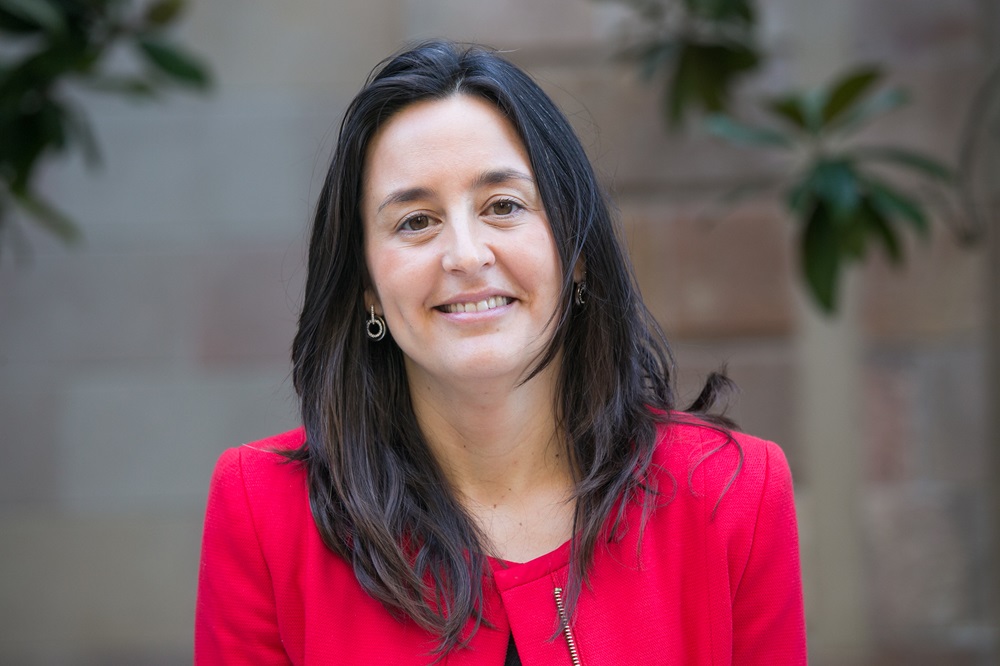- Face to face
- 2 de September de 2024
- No Comment
- 10 minutes read
Esther Niubó: “It is essential to restore the pride and prestige of our own system and of education in general”

FACE TO FACE WITH…
Esther Niubó, Councillor for Education and Vocational Training of the Generalitat of Catalonia
Esther Niubó: “It is essential to restore the pride and prestige of our own system and of education in general”


Engaging with Esther Niubó offers a profound and nuanced understanding of educational issues. Her well-informed and pragmatic perspective allows for a discussion rooted in reality. Esther holds a degree in Political Science and Public Administration, specialising in International Relations, from the Universidad Autonoma de Barcelona, where she graduated with honours. She furthered her education with a Master’s in International Politics from the Free University of Brussels, a Master’s in Foreign Trade and International Economics from the University of Barcelona, and a Master’s in Public and Social Policies from Pompeu Fabra University – John Hopkins University.
She has worked as an analyst for the Secretaría de Política Europea e Internacional at the Catalan Socialist Party (2001-2004) and as an adviser in the European Parliament (2004-2009). At the Rafael Campalans Foundation, she served as Coordinator of Institutional and International Relations (2010-2013) and later as Director (2013-2020). She remains an active member of its Board of Trustees. Additionally, she has contributed as a collaborator in the Department of Social Sciences at ESADE (2010-2012). Since 2015, she has represented her constituency as a Member of the Catalan Parliament and serves as the Secretary for Education and Vocational Training for the Catalan Socialist Party. Moreover, she has been a councillor at Castelldefels Town Council since 2019. Most recently, on 12 August, she was appointed Councillor for Education and Vocational Training of the Generalitat of Catalonia, under the newly established government led by Salvador Illa.
What do you expect from an interview?
My hope is that what I express accurately reflects my thoughts and who I am, and that it resonates with those who read it.
What will be the main lines of educational policy that await us for the next four years?
From the Department of Education and Vocational Training, our main challenges will be to promote educational improvement and the reinforcement of student learning, a challenge that is inseparable from equity and inclusion, as well as the reinforcement of the Vocational Training system. From here, we want to base this legislature on the basis of good work, planning, dialogue and listening, to achieve complicity and agreements that help to give stability to the system and allow our students to achieve the challenges they will have to face once their training stage is finished.
“Dialogue with social agents will be the basis of our action from the Department”
Regarding to the previous education policies we’ve had up to now, wich ones do you think they should not be continued?
It is not our style to make value judgments about what previous councilors have done well or badly. We prefer to focus on what we can contribute to improve our educational system and ensure that in the medium term it recovers the prestige it deserves. From there, dialogue with social agents will be the basis of our action from the Department.
What will be the main lines of educational policy that await us for the next four years?
From the Department of Education and Vocational Training, our main challenges will be to promote educational improvement and the reinforcement of student learning, a challenge that is inseparable from equity and inclusion, as well as the reinforcement of the Vocational Training system. From here, we want to base this legislature on the basis of good work, planning, dialogue and listening, to achieve complicity and agreements that help to give stability to the system and allow our students to achieve the challenges they will have to face once their training stage is finished.
Regarding to the previous education policies we’ve had up to now, wich ones do you think they should not be continued?
It is not our style to make value judgments about what previous councilors have done well or badly. We prefer to focus on what we can contribute to improve our educational system and ensure that in the medium term it recovers the prestige it deserves. From there, dialogue with social agents will be the basis of our action from the Department.
What was your last professional project before transitioning fully into politics?
Before joining the Catalan Parliament as a Member, my last project was at the Rafael Campalans Foundation, where I first coordinated Institutional and International Relations and later served as Director.
You also worked as a lecturer, didn’t you?
Yes, I was able to combine my work with teaching in a Master’s programme at ESADE’s Department of Social Sciences for a time. It was an intense, rewarding, and educational period, much like my earlier experience as an adviser in the European Parliament.
What initiatives did you promote in Europe?
At the Foundation, we initiated debates on the challenges and future of the European left in response to the 2008 crisis, collaborating with other progressive political foundations across Europe, such as the Friedrich Ebert Foundation, Fundación Alternativas, FEPS, and CIDOB. We also supported various political cooperation projects in the Mediterranean, particularly during the Arab Spring, along with other initiatives related to historical memory and social policy analysis.
How do your professional projects connect with your educational background?
I have fond memories of my teachers, especially in secondary school. Some of them imparted far more than just subject knowledge; they significantly influenced my way of thinking and the interests I later pursued in my professional life.
What impact did university have on your life?
University opened up new worlds for me. I had the opportunity to learn from experts in various fields—political science, law, economics, international relations, and more—and from peers from different parts of Catalonia, which broadened my perspective even further. My internships were crucial for shaping my professional future, and the various Master’s programmes I completed provided the specialised training I needed.
Reflecting on the current educational system, if you had been educated under a system similar to the one we have now, do you think your professional development would have been different?
It’s challenging to speculate, but I think I might have been less fearful of public speaking, which was a struggle for me at the time. I might also have found mathematics and scientific subjects more accessible based on learning approaches, though perhaps I wouldn’t have delved as deeply into humanistic, social, or linguistic studies. But it’s difficult to say, as much depends on the educational approach and the teachers one encounters.
In what areas do you think you could have improved?
I was always been a good student, but in today’s system, I might have seen greater applicability in subjects requiring a scientific approach, rather than viewing them as beyond my reach. I would likely have adapted more quickly to new information and communication technologies, developed greater creativity and entrepreneurial spirit, and become more comfortable with oral expression at an earlier stage.
Conversely, where do you think you might have faced challenges?
Conversely, I might have explored certain content less deeply, which could have hindered my ability to develop a comprehensive and critical understanding of the world and history. However, this largely depends on various social and familial factors. Society today is also not the same as it was in the 1980s.
“We need to recognise and elevate the teaching profession, and integrate other non-teaching professionals to support an increasingly diverse and complex student body”
Given your professional background, how do you think the current education system could be improved?
It is crucial to restore pride and prestige in our education system and in education as a whole, as it drives progress, equal opportunities, and social cohesion. We need to recognise and elevate the teaching profession, while also integrating other non-teaching professionals to support an increasingly diverse and complex student body. Additionally, we must focus on improving students’ educational outcomes, ensuring they acquire essential skills, and reducing dropout rates and early school leaving. Strengthening successful methodologies for teaching mathematics, reading, writing, and oral expression is also vital, as is evaluating the introduction of new teaching methods and digitalisation in schools, using evidence and indicators to foster ongoing improvement of the education system.
From an idealistic standpoint, what is your vision for the future of society?
I envision a more egalitarian and socially just society, one that is free and diverse, with excellent public services that serve all citizens, fostering equal opportunities and progress. I wish for a healthier, more cultured, and more critically-minded society.
Source: educational EVIDENCE
Rights: Creative Commons

